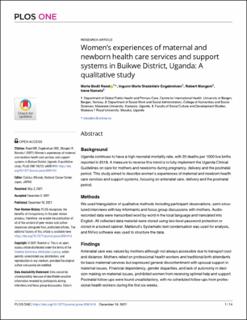| dc.contributor.author | Rød, Marte Bodil | |
| dc.contributor.author | Engebretsen, Ingunn Marie Stadskleiv | |
| dc.contributor.author | Namata, Irene | |
| dc.contributor.author | Mangeni, Robert | |
| dc.date.accessioned | 2022-01-31T07:50:58Z | |
| dc.date.available | 2022-01-31T07:50:58Z | |
| dc.date.created | 2022-01-07T13:47:06Z | |
| dc.date.issued | 2021 | |
| dc.identifier.issn | 1932-6203 | |
| dc.identifier.uri | https://hdl.handle.net/11250/2975793 | |
| dc.description.abstract | Background
Uganda continues to have a high neonatal mortality rate, with 20 deaths per 1000 live births reported in 2018. A measure to reverse this trend is to fully implement the Uganda Clinical Guidelines on care for mothers and newborns during pregnancy, delivery and the postnatal period. This study aimed to describe women’s experiences of maternal and newborn health care services and support systems, focusing on antenatal care, delivery and the postnatal period.
Methods
We used triangulation of qualitative methods including participant observations, semi-structured interviews with key informants and focus group discussions with mothers. Audio-recorded data were transcribed word by word in the local language and translated into English. All collected data material were stored using two-level password protection or stored in a locked cabinet. Malterud’s Systematic text condensation was used for analysis, and NVivo software was used to structure the data.
Findings
Antenatal care was valued by mothers although not always accessible due to transport cost and distance. Mothers relied on professional health workers and traditional birth attendants for basic maternal services but expressed general discontentment with spousal support in maternal issues. Financial dependency, gender disparities, and lack of autonomy in decision making on maternal issues, prohibited women from receiving optimal help and support. Postnatal follow-ups were found unsatisfactory, with no scheduled follow-ups from professional health workers during the first six weeks.
Conclusions
Further focus on gender equity, involving women’s right to own decision making in maternity issues, higher recognition of male involvement in maternity care and improved postnatal follow-ups are suggestions to policy makers for improved maternal care and newborn health in Buikwe District, Uganda. | en_US |
| dc.language.iso | eng | en_US |
| dc.publisher | Public Library of Science | en_US |
| dc.relation.uri | https://doi.org/10.1371/journal.pone.0261414 | |
| dc.rights | Navngivelse 4.0 Internasjonal | * |
| dc.rights.uri | http://creativecommons.org/licenses/by/4.0/deed.no | * |
| dc.title | Women’s experiences of maternal and newborn health care services and support systems in Buikwe District, Uganda: A qualitative study | en_US |
| dc.type | Journal article | en_US |
| dc.type | Peer reviewed | en_US |
| dc.description.version | publishedVersion | en_US |
| dc.rights.holder | Copyright 2021 Roed et al. | en_US |
| dc.source.articlenumber | e0261414 | en_US |
| cristin.ispublished | true | |
| cristin.fulltext | original | |
| cristin.qualitycode | 1 | |
| dc.identifier.doi | 10.1371/journal.pone.0261414 | |
| dc.identifier.cristin | 1976588 | |
| dc.source.journal | PLOS ONE | en_US |
| dc.identifier.citation | PLOS ONE. 2021, 16 (12), e0261414. | en_US |
| dc.source.volume | 16 | en_US |
| dc.source.issue | 12 | en_US |

